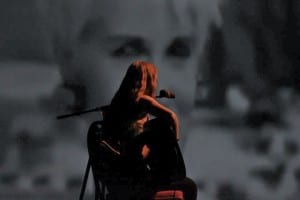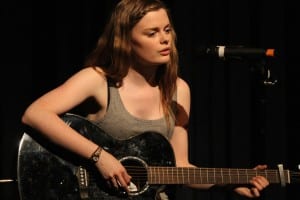Contemporary theatre often involves issues that affect every day modern culture and society as a whole. Theatre companies may present a message to the audience and include current subjects that the audience can relate to, mixing “a real-world issue with a narrative.” (Gardner, 2012), connecting with them on a political, social or emotional level. When referring to the word ‘political’, I understand this holds several meanings, and these meanings change “depending for instance on whether the term is taken to refer to activities of government and other social systems and organisations, or to the study of such activities and systems, or to the processes by which power is distributed – and struggled over – in society more generally.” (Kelleher 2009, p.2). The latter is the approach that our theatre company have taken, with the intention to create theatre that involves issues that we are surrounded by in everyday life and therefore affects the audience we are performing to. Some of these issues may include celebrity and pop culture, drug abuse, feminism and self-image.
This relates closely to the work of Augusto Boal and his Theatre of the Oppressed, which first came to play in the 1960s. Theatre of the Oppressed is a dramatic practise which discusses the “relations between theatre and politics” (Boal 2000, p.1). This practise is still apparent in modern theatre today as it contains social or political issues that are currently concerning the corresponding audience. This can be experimented with and explored through technologies, such as forms of multimedia and also the designing of the set and staging. Theatre of the Oppressed “is considered to present always a vision of the world in transformation and therefore is inevitably political insofar as it shows the means of carrying out that transformation” (Boal 2000, p.1). This type of theatre also places the audience in a different role, one that challenges the traditional spectator’s role with the encouragement for their involvement. With reference to the political aspect to this theatre practise, the audience are given a voice, sometimes literally, unlike traditional styles of theatre, and this is pushed by the subjects involved within a performance.
One scene which evokes a message and has much relevance to our modern culture in particular in our production of Take Me By The Tongue is entitled ‘Golden Ticket’. This scene includes a projection playing a series of short clips of well-known female celebrities. Some of these film clips include interviews, red carpet premiers, music videos, sections of films, stage performances and also a video diary. The celebrity figures that I have decided to incorporate into the short film have all died in similar circumstances; from a drug overdose.
The topic of drug abuse feels very relevant in the 21st society we now live in, especially with regards to fame and the celebrity lifestyle. The short film will be muted whilst I sing the poem ‘I’ve got a golden ticket’ by Roald Dahl, to a melody I have composed on acoustic guitar. Some of the lyrics read: “I never dreamed that I would climb, over the moon in ecstasy. But nevertheless, it’s there that I’m shortly about to be.” (Dahl, 2010). This scene takes the poem and reinterprets the meaning of the ‘golden ticket’, changing it to the power and oppression that fame can hold; although many young people aspire to become famous, the reality is that the lives celebrities lead aren’t always as perfect as they are made out to be. This scene is simple and subtle, and doesn’t force this message upon the audience, however it does leave the audience to find the message and interpret it in their own way. This short scene aims to evoke thought and opinion within the audience and this is something that, as a company, we aim to achieve in all of our work. The subject of alcohol and drug addiction is contemporary but also, as shown in the video, it has been an ongoing issue over the last few decades, showing the ongoing oppression that comes with fame. This is therefore recognisable to a wide audience age range, which again is important with regards to the company’s manifesto.
https://www.youtube.com/watch?v=b7X5BMbwidU
(Images of Libby Soper performing ‘Golden Ticket’ in Take Me By The Tongue. Photos taken by Jozey Wade and Phil Crow)
As a contemporary theatre company, Hand Me Down have work-shopped different ways to perform, experimenting with styles such as physical theatre/dance and through the use of song. Scott McMillin on The Musical As Drama comments: “musical numbers should carry on the action of the play and should be representative of the personalities of the characters who sing them” (2006, p.2). It is made clear in Take Me By The Tongue that we are the performers, as we place ourselves into character in front of our audience, and certain scenes are performed rather than acted. ‘Golden Ticket’ is one of those scenes as the video and song reiterate the emotion needed without having to act. The lyrics are very important however, and the melody that goes with it also has to be the right genre to properly indicate the tone and the meaning of the lyrics and the scene. Including music in performance is a stimulating way of presenting text as well as evoking various emotions: “memories and emotions are stimulated in the audience from which they extrapolate meaning.” (Taylor 2012, p.139).
There are many successful theatre companies that produce political theatre productions in the UK, one of the most famous being Red Ladder. Red Ladder’s manifesto aims “To make high quality theatre which provokes debate about the world in which we live…We seek to redefine and reclaim notions of popular, political and radical in a theatre context” (Red Ladder, 2014). Creating theatre from current affairs or ongoing issues that affect society establishes a wide range of audience. Subjects that concern modern life and are headlining newspapers, or events that have taken place in history that affected society are the issues that will spark opinions and, although some may be controversial, it causes much interest and discussion. Red Ladder’s, Sex & Docks & Rock ‘n’ Roll (2013) is one example of a comedy musical they produced about, “love, change and solidarity, set against the backdrop of the 1960 Liverpool dockworkers’ and seafarers’ strike.” (Red Ladder, 2014). This describes just a few of the issues they involve within their work, aimed to evoke emotions and opinions towards and about the topics they present to their audiences.
Work Cited:
Boal, Augusto (2000) Theatre of the Oppressed, London: Pluto Press.
Dahl, Roald (2010) Poetry By Roald Dahl “I’ve Got a Golden Ticket”. [online] Available from: http://roalddahlpoetry.weebly.com/poetry.html[Accessed 14 March 2014].
Gardner, Lyn (2012) How political theatre changed its tune. [online] Available from: http://www.theguardian.com/stage/theatreblog/2012/jun/06/political-theatre-changed-its-tune [Accessed 21 April 2014].
Kelleher, Joe (2009) Theatre and Politics, London: Palgrave MacMillan.
McMillin, Scott (2006) The Musical As Drama, Oxfordshire: Princeton University Press.
Red Ladder (2014) Red Ladder Theatre Company: History. [online] Available from: http://www.redladder.co.uk/about/history/ [Accessed 21 April 2014].
Taylor, Millie (2012) Musical Theatre, Realism and Entertainment, Surrey: Ashgate Publishing Limited.






